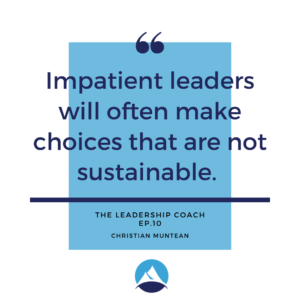Why You Need To Manage To Outcomes (…And How)

This is the second article in a series for overwhelmed leaders. In it, I explore how a single management tool can free you from feeling overwhelmed while  helping your team accomplish so much more.
helping your team accomplish so much more.
Years ago, I was the executive director of a non-profit. We were of the passionate, overworked, under-resourced variety of non-profits. Feeling overwhelmed was “in the air”. My staff felt like there was no way to get all of their work done. They’d come to me for guidance or help. But I felt like I was barely treading water. I tended to be short and to not always offer helpful responses.
It just made things worse. I finally realized there was a problem. The problem was me.
Feeling overwhelmed is a major challenge for most people in leadership roles. The constant demand for setting direction, clarifying expectations, making decisions, helping others make decisions, tracking progress, arbitrating disputes, solving problems, putting out fires…
It’s a lot.
What if it could be different? What if you didn’t have to feel overwhelmed? What if you could actually accomplish while not feeling overwhelmed?
I did. And you can.
At the very core, I realized I was so busy getting work done that I wasn’t actively leading or managing my team. I was too busy doing the wrong work. Which made my team too busy to do the right work. Finally, I stopped what I was doing, and began to do what I should have been doing all along.
I began to manage to outcomes.
What Are Outcomes?
The concept of managing to outcomes isn’t a new one. But for many leaders, it feels slippery or ethereal. Kind of like an obscure economic theory. One where you are pretty sure it doesn’t matter if you understand it or not.
Except, in this case, it matters a lot.
So, what is managing to outcomes? Actually, what is an outcome?
Outcome = what you desire to accomplish. Synonyms for outcomes: Desires, “the point”, purpose, results.
Your outcomes answer the question – Why?
I wasn’t a natural vacationer. Although I’ve gotten a lot better at it. However, when I first took vacations, I viewed them as challenges to overcome. “I will vacate faster and better than anyone else!”
I guess I missed the point. Or the outcome.
My wife is great at vacationing. She is very focused on the point of the vacation. Or the outcome. We’ve learned to talk about our vacations in terms of the intended purpose, point, or outcome of the vacation.
This is for my benefit. Not hers. She already gets it. I need the help with calibration.
- Is it to reconnect with family we haven’t seen in a while?
- Is it to rest and relax?
- Is it to have an adventure and create a new memory?
It could be any one or a combination of the above. Or something else altogether. But the above list contains examples of outcomes. The point. The purpose of the vacation.
Going to Hawaii isn’t an outcome. It’s a method. It’s an approach to accomplish one of these outcomes. Why do we go to Hawaii? This time because…we want to relax and maybe have some family adventures.
After we know what we want, we plan towards that outcome. We can set the goals and design what we need to do to help us achieve the outcome of relaxing with a few adventures thrown in.
See how that works?
The Difference Between Effort, Goals, and Outcomes
Most leaders (and teams) that I meet have reasonable or even high work ethics. But there are some common areas where they are confused:
They confuse effort with outcome. They work extremely hard – but aren’t always sure what direction they are working towards. But because they’ve put in the effort, they are reasonably confident it must all add up to something worthwhile. This is like me thinking that I need to do vacation. I need to get out there and rest hard.
It’s ridiculous, but when we are working hard – it doesn’t feel ridiculous.
They confuse goals for outcomes: Some leaders do a great job of setting goals. But they don’t always ensure that the goals will achieve the outcomes (or results) For example, it’s easy (I know) to set goals: 1) Go to Hawaii 2) Find Costco 3) Go to the luau 3) Explore all of the snorkeling beaches 4) Drive the one road on the island to its bitter end – and either never know what outcome we hoped to accomplish, or miss it altogether.
Goals are good. They aren’t outcomes.
The Value of Outcomes for Managers: Autonomy and Accountability = Simpler Management = Freedom / Value / Scaling
In terms of managing your team, learning to manage to outcomes will help create autonomy and accountability within your team. In other words, they’ll be easier to manage. Simple management equals freedom. You can use that freedom to either accomplish more or do less. It’s your call.
If you are an executive or business owner, you can use this to increase the value of what you offer or the organization as a whole. You can better harness the creative energy of your team to produce even more growth without growth becoming unmanageable.
Why Don’t We Manage To Outcomes?
Leaders usually struggle to manage to outcomes for two reasons.
- We don’t know what we want: We haven’t taken the time to get clear about what we really want and how we’ll know if we have it.
- We don’t trust: We don’t really trust that others will work as hard, as well, as long, as effectively as us. We just don’t trust. Which usually goes back to a fear of failure. Which, ironically, tends to produce behaviors that prevent or limit success.
How To Manage To Outcomes
- Define your outcomes: To manage to an outcome you have to know what they are. The following questions help:
- What is it that you hope to accomplish?
- What makes that important to you?
- What happens if you don’t accomplish it?
- Is there anything else?
- Why?
The kinds of outcomes that leaders often tell me are both quantitative and qualitative. Common examples are:
-
- To become profitable
- Growth and to become a leader in our industry
- To hand over your business to a family member without confusion or conflict
- To enjoy working as a team
- To feel happy at work
- Clarify how you will measure success: Most outcomes in the business world are measurable. Using the above examples:
-
- Has profitability increased?
- Are we leading the industry in total sales?
- Have we successfully handed over control of the company? Did we communicate well and work through disagreements respectfully?
- Do individual team members indicate that they enjoy working with each other?
- Do individual team members indicate that they enjoy their jobs and look forward to the future of the company?
After this, develop your plan. This is the part most leaders know. But don’t confuse the methods you use or goals you pursue with an outcome. A team-building event might be a method. Attending a team-building retreat might be a goal.
But, as all teams know, you can do all of those things and never hit your objective: Building a healthy and high-performing team.
The Rest Of The Story
I sat my team down and we began to discuss our objectives. At first, these conversations created even more stress. To the point of tears for some. But we talked through our objectives and made sure they were clear. Then, as a group, we clarified how we would measure success. Following this, we built a plan together. In our case, we mapped it out on a calendar. The impact was amazing. Within the course of the meeting, the mood shifted from tension and tears to smiles and relief.
- Because they knew what their objectives were, and how to measure progress, their sense of “overwhelm” dissipated and was replaced with optimism and anticipation.
They were able to work with much more autonomy.
- Because I was clear on what our objectives were, and how to track them, my management load was dramatically simplified.
I had tools that made accountability easy for all of us.
I never forgot the lesson of that experience. I hope you are able to learn from it as well.
Take good care,
Christian
Would you like my help for yourself, your team or board to get a clear vision of 2020? Don’t leave it to chance. Give me a call 907-522-7200 or e-mail me.
FREE TOOL: The Value Builder System
Are you curious about the value of your company? The Value Builder System™ is a 13-minute online questionnaire that evaluates your business on the eight factors that contribute more to its attractiveness and value. These factors are scored on a scale of 1-100. Businesses that score over 80 are likely to command 70%-100% higher value than others. Click here to learn more or get your free Value Builder Score.
Check out my new podcast, THE LEADERSHIP COACH, where we explore effective, high impact and enjoyable leadership. We talk about personal development and the attributes that all effective leaders possess. I interview other leadership experts who share their knowledge and tips to help you build the confidence to lead and learn the habits of good decision-making. Episode 10, Patience Makes Perfect, is now available. In this episode, I talk about the importance of having patience during your development as a leader, and while developing your ability to lead effectively.

Opportunities
Did someone send you this article? You can receive it, free, directly from me each week. Click here to sign up. You can unsubscribe at any time. I won’t feel too hurt.
Free Resource: How To Accomplish More Without Doing More is a workbook I created to walk leaders through a process of helping you own your calendar, liberate your time, and still get more done. Download it for free!
Executive and Leadership Coaching: Do you feel overwhelmed? Are you not getting the results you expect from the effort you are putting in? Do you find yourself facing similar challenges time and time again? Would you like to change specific ways of relating or reacting? If you would like to experience predictable, measurable growth Contact me.
Profitable Exit Strategy Workshop: Are you a business owner or partner? Are you over 55? Are you starting to think about exiting your business or active management in the next 3-5 years?
- Are you curious about what your business might be worth?
- Would you like to discover the specific steps you need to take to increase its value and become highly attractive to a buyer?
- Are you planning on handing it over to family or employees and you want to ensure long-term success?
If so, contact me now.
Article Categories
Popular articles

Download my free 10-page eBook:
How To Accomplish More Without Doing More:
Eight Proven Strategies To Change Your Life
Discover how to save eight hours during your workweek-even if you're too busy to even think about it. The resource every maxed out executive needs.